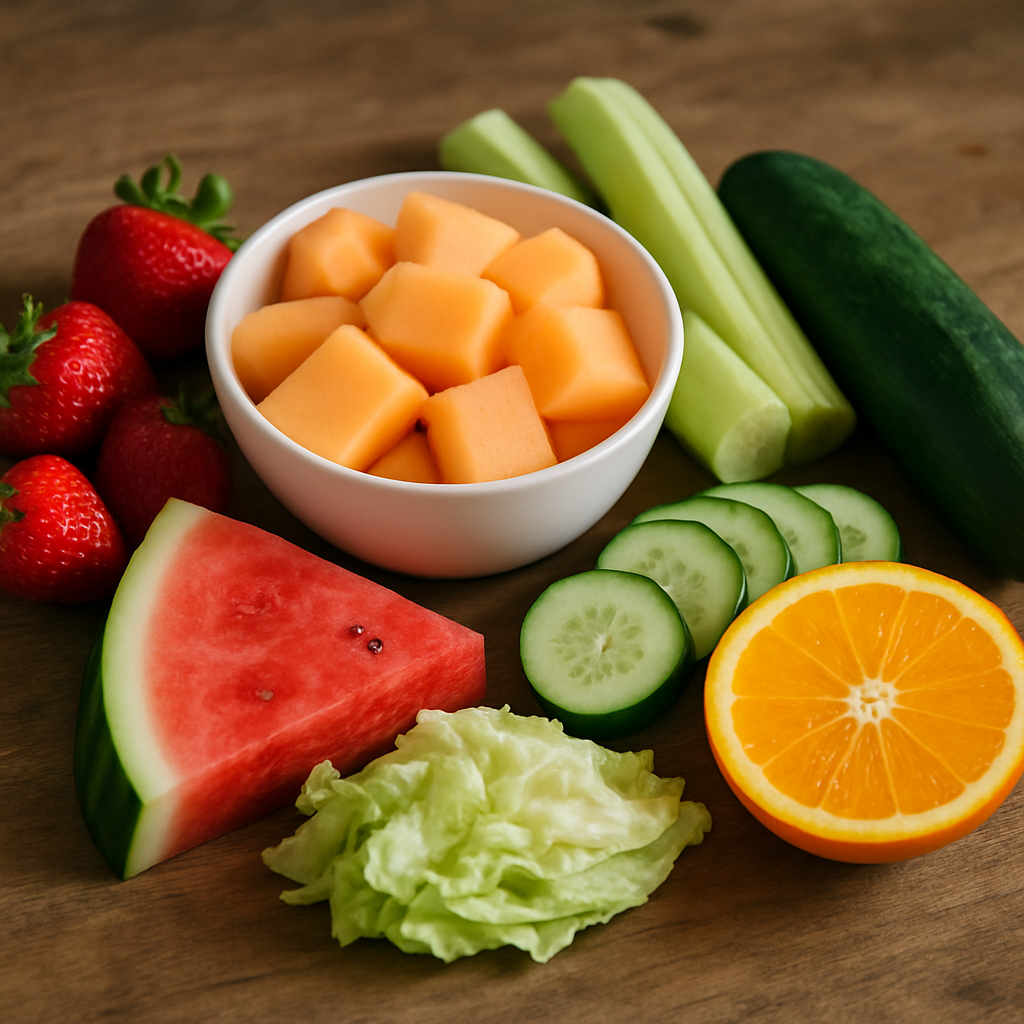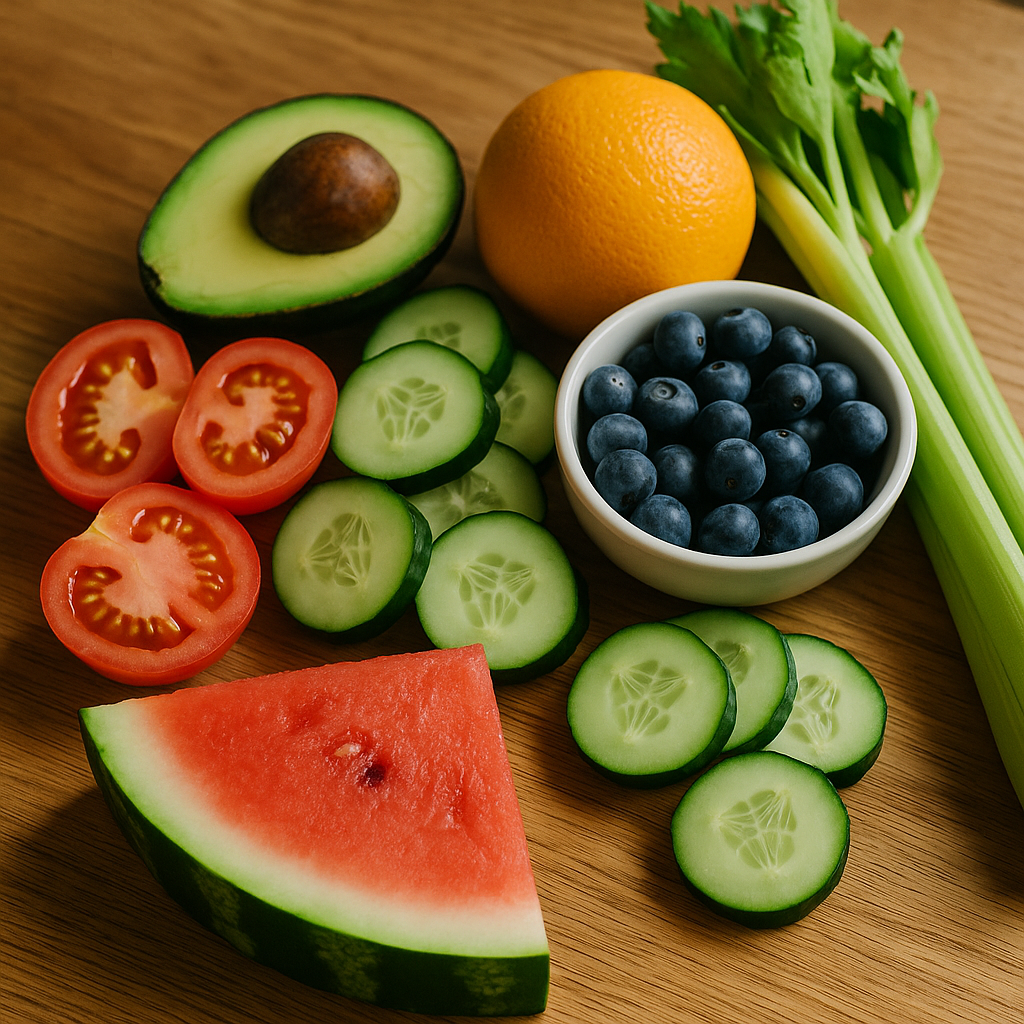आयुर्वेदिक डॉक्टर से प्रश्न पूछें और निःशुल्क या भुगतान मोड में अपनी चिंता की समस्या पर ऑनलाइन परामर्श प्राप्त करें। 2,000 से अधिक अनुभवी डॉक्टर हमारी साइट पर काम करते हैं और आपके प्रश्नों का इंतजार करते हैं और उपयोगकर्ताओं को उनकी स्वास्थ्य समस्याओं को हल करने में प्रतिदिन मदद करते हैं।
How to Stay Hydrated in Summer: Ayurvedic Guide

When the heat of summer rolls in, our bodies start craving ways to cool down. Knowing how to stay hydrated in summer is not just about drinking water all day—it’s about understanding body hydration, balance, and natural ways of replenishing energy. Ayurveda, the ancient Indian science of wellness, gives us timeless tips on how to hydrate body effectively while keeping digestion, skin, and energy in check.
But here’s the truth: people often think drinking endless glasses of plain water is enough. It’s not always. Hydration is about more than quenching thirst. It’s about keeping electrolytes stable, choosing hydrating foods, and even following certain daily routines that maintain natural cooling. In this article, we’ll explore not only how to stay hydrated but also Ayurvedic wisdom that makes the process simpler—and healthier.
Why Hydration Is Crucial in Summer
The blazing sun can quickly disturb the body’s fluid balance. Sweating more than usual means we lose water, minerals, and essential salts. That’s why how to be hydrated is more than a lifestyle choice in summer—it’s a necessity.
If the body doesn’t get enough fluids, you’ll notice fatigue, dizziness, dryness of skin, or even brain fog. Some people get headaches without realizing dehydration is the root cause. Ayurveda teaches that excess heat (known as “Pitta dosha”) builds up in summer, making us more vulnerable to inflammation, irritability, and digestive issues.
Good hydration cools down Pitta, stabilizes mood, and supports proper digestion. Plus, it helps skin glow and keeps energy steady throughout the day. It’s not dramatic to say that proper hydration is one of the easiest ways to feel better in the hot months.
How to Control Dehydration in Hot Weather
So, how to control dehydration before it even begins? Prevention is smarter than cure here.
-
Drink before you’re thirsty. Once the brain signals thirst, you’re already a little dehydrated. Small sips every hour works better.
-
Avoid excess caffeine and alcohol. They act like diuretics, pushing water out of your system.
-
Incorporate cooling routines. Ayurveda recommends not overexposing yourself to harsh midday sun, and balancing activity with rest.
-
Eat water rich foods. We’ll dive deeper into this later, but cucumbers, melons, and leafy greens provide hydration from inside.
By blending modern understanding with Ayurvedic practices, you can reduce the risk of dizziness, low energy, or heat exhaustion.
स्वयं दवा न लें और प्रतीक्षा न करें। अभी डॉक्टर से चैट शुरू करें
How to Stay Hydrated in Summer Naturally
The question isn’t just how to stay hydrated in summer heat, but how to do it naturally. Ayurveda emphasizes that hydration should harmonize with digestion—drinking ice-cold water, for example, might seem refreshing but can shock the digestive fire (“Agni”) and slow metabolism.
Instead, focus on room-temperature or slightly cool drinks infused with herbs like mint, fennel, or coriander. This cools down heat without disturbing digestion.
How to Hydrate Body Fast and Safely
Sometimes, you need quick results. For example, after coming home from a long walk in summer, you might wonder how to hydrate body fast. Ayurveda recommends coconut water as one of the best natural rehydrators. It’s full of electrolytes, easy to digest, and instantly cooling.
Another safe option is adding a pinch of rock salt and a little jaggery (or honey) to water. This simple homemade electrolyte drink helps the body absorb fluids faster than plain water.
How to Stay Hydrated Without Drinking Water
It might sound strange at first—how to stay hydrated without drinking water? But if you look closely at your diet, you’ll realize a huge portion of hydration comes from food itself. Ayurveda highlights that many fruits, vegetables, and even certain grains contain natural water that the body absorbs slowly and efficiently.
Think about it: when you eat watermelon, cucumber, or oranges, you’re not only getting water but also vitamins, minerals, and cooling energy. These foods hydrate while nourishing deeper tissues. That’s why Ayurvedic experts often say food-based hydration is gentler and more sustainable than forcing gallons of water.
Another practice? Soaking fennel seeds overnight and sipping the strained water in the morning. It’s naturally cooling and helps maintain internal balance during hot weather.

Hydrating Foods in Ayurveda
Ayurveda doesn’t just classify food by taste—it sees their effect on body heat, digestion, and balance. When it comes to body hydration, certain foods calm excess Pitta dosha and provide steady water release. Let’s break them down.
Water Content Vegetables for Body Hydration
Vegetables with high water content are champions of summer diets. Cucumbers, zucchini, lettuce, and bottle gourd (lauki) are classic examples. These water content vegetables not only cool down the system but also support light digestion, which is important because heavy meals in summer can cause fatigue.
Ayurveda often suggests steaming or lightly cooking them instead of eating everything raw, since raw foods in excess may weaken digestion. For example, cucumber raita (yogurt with cucumber) is a traditional dish that combines hydration with digestive support.
Water Rich Foods That Support Cooling and Energy
Beyond veggies, fruits play a massive role. Watermelon, muskmelon, papaya, and berries are considered water rich foods. They give hydration while also recharging your energy. Bananas and pomegranates, though not extremely water-dense, support energy and maintain minerals.
Tender coconut is another gem: it balances electrolytes, improves energy, and feels naturally sweet without added sugar.
Interestingly, Ayurveda also recommends grains like rice and barley during summer. They have a naturally cooling effect and can help with how to be hydrated through balanced meals.
Fruits and Drinks That Help to Stay Hydrated
If you’re wondering how to keep your body hydrated in a fun way, fruits are the easiest answer. Watermelon slices, oranges, and grapes are refreshing. But also try Ayurvedic-inspired drinks:
-
Amla (Indian gooseberry) juice: Rich in vitamin C, cools down heat and improves skin health.
-
Buttermilk (chaas): A probiotic-rich drink that supports digestion while keeping hydration steady.
-
Herbal infusions: Hibiscus tea, coriander water, or mint tea are naturally cooling and light.
Ayurveda avoids processed sugary sodas or artificially flavored drinks because they create more internal heat and can actually worsen dehydration in the long run.
Food-based hydration is not only about quenching thirst, but also about building resilience in the body. By including the right mix of fruits, vegetables, and cooling drinks, you’re supporting natural energy flow and avoiding the sudden crashes that come with only gulping cold water.

Ayurvedic Practices for Body Hydration
Ayurveda isn’t only about what you eat or drink—it’s also about how you live daily. When it comes to how to stay hydrated in summer heat, lifestyle choices make a huge difference.
Daily Routines to Stay Hydrated in Summer
-
Morning rituals: Start the day with a glass of lukewarm water infused with a few soaked raisins or fennel water. It sets hydration and digestion on the right track.
-
Avoid overheating: Walking or exercising during peak sunlight hours drains energy fast. Early morning or evening is better.
-
Balanced meals: Instead of heavy fried food, Ayurveda recommends light khichdi (rice and lentil mix), soups, or porridges. These foods have high water content and digest smoothly.
-
Skin cooling: Applying aloe vera gel or rose water externally helps prevent dehydration signs like dryness or burning.
These may sound simple, but following them daily keeps body hydration steady and reduces the risk of exhaustion.
Cooling Drinks and Herbal Remedies
If you’re wondering how to hydrate body fast, especially after being in the sun too long, Ayurveda suggests herbal remedies over commercial sports drinks.
-
Coconut water: Already mentioned, but worth repeating—it’s nature’s electrolyte solution.
-
Lassi (yogurt drink): Sweet lassi or spiced buttermilk balances heat and replenishes fluids.
-
Herbal blends: Coriander seeds, cumin seeds, and fennel seeds boiled in water, then cooled, make a wonderful summer coolant.
Another tip: rose syrup or diluted pomegranate juice can be taken occasionally for cooling effect. But don’t overdo sweet drinks; moderation is always key in Ayurveda.
Conclusion
Learning how to stay hydrated in summer is more than a quick hack—it’s about cultivating habits that keep the body balanced, cool, and energized. Water is essential, yes, but hydration also comes from hydrating foods, water rich foods, herbal drinks, and mindful daily routines.
By understanding how to keep your body hydrated, you not only prevent fatigue and dizziness but also support long-term health. Ayurveda’s gentle wisdom reminds us that staying cool and nourished doesn’t need complicated solutions—it’s about listening to the body and making small but smart choices.
So next time you step out into the blazing heat, remember: hydration isn’t just about filling a bottle. It’s about lifestyle. And honestly, once you start making these changes, you’ll notice you don’t just survive summer—you actually enjoy it.
✨ Try a few of these Ayurvedic tips this week and see how you feel. And hey, share this article with friends who always forget to drink water—it might just save them from a nasty headache.
FAQs
Which foods are best for body hydration?
Cucumbers, watermelon, muskmelon, coconut water, and leafy greens are among the top. They provide hydration plus vitamins and minerals.
How to stay hydrated without drinking much water?
Incorporate water content vegetables and fruits like melons, oranges, and grapes. Also, try buttermilk or herbal teas for natural hydration.
What are the signs of dehydration in summer?
Common signs include dizziness, headaches, dry mouth, fatigue, dark urine, and even irritability. If ignored, it can escalate to heat exhaustion.

